By Laura Misch
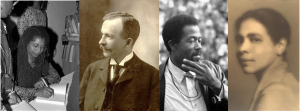
February is much more than a month-long rumination on your current relationship status. It’s a time to recognize and appreciate Black History Month through the acknowledgment of African-American achievements. Although we should always celebrate the past and present achievements of African-Americans, Black History Month designates a special time during which we can actively commemorate the contributions these individuals have made to our shared history. And I personally can’t think of a better way to celebrate than with books, so I decided to ask a few of our lovely English professors what they think is a must-read book by an African-American author.
Now, before I dive into the recommendations, you may be asking yourself, “why read a book for Black History Month?” Well, if you were to ask Dr. Hiro, she would tell you, “It’s through the study of African-American literature that I have learned about African-American history and, really, about American history.” In other words, bring on the books.
The Marrow of Tradition (1901) by Charles W. Chesnutt
Suggested by: Dr. Hiro
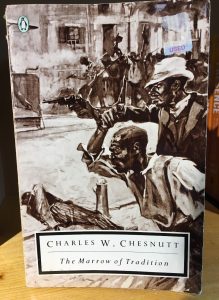
Let’s start with the oldest book on the list! For those of you who took ENG 225 with Prof. McDonald, you may recognize Charles Chesnutt as the author of The House Behind the Cedars. The Marrow of Tradition is a historical novel of his based on a race riot that occurred in Wilmington, North Carolina, in 1898. Dr. Hiro describes this work as “a beautiful fictionalization of all the forces” surrounding this historic event in which white supremacists were able to successfully have “the town [of Wilmington] emptied out of black folks.” Chesnutt himself hoped this novel would become “the legitimate successor” of Harriet Beecher Stowe’s famous novel Uncle Tom’s Cabin. While the novel never received great literary prestige, it still effectively shines a light on the reality of post-Reconstruction America.
Quicksand (1928) or Passing (1929) by Nella Larsen
Suggested by: Dr. Brassard
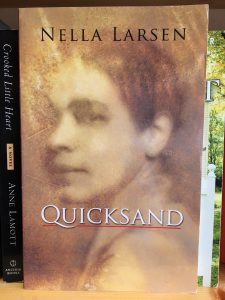
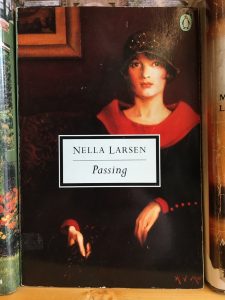
For a long period of time, Harlem Renaissance writer Nella Larsen flew under the radar, but her work has made a resurgence in recent decades. Dr. Brassard recommends Larsen’s only published novels, which follow the life of a mixed-race woman as she navigates the murky waters of racial identity. Dr. Brassard praises the clear intersectionality found within these works, pointing out that “both books deal with gender and class as well as race issues.” Another huge plus it that both books are incredibly short. Each is under 150 pages! (Also, shout-out to Dr. Larson, who also recommended Passing!)
The Fire Next Time (1963) by James Baldwin
Suggested by: Dr. Larson
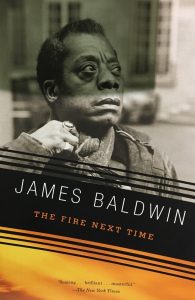
Dr. Larson recognizes that we students are often “short on time,” so he suggests reading Baldwin’s book The Fire Next Time. The book consists of two essays. The first one is a letter to his fourteen-year-old nephew, which discusses the role of race in U.S. History. Dr. Larson says this essay presents “a powerful and blazingly honest assessment of America in the ‘60s.” He also notes that “this is the book on which Ta-Nehisi Coates based his own epistolary excoriation of his era: Between the World and Me.”
Soul On Ice (1968) by Eldridge Cleaver
Suggested by: Prof. McDonald
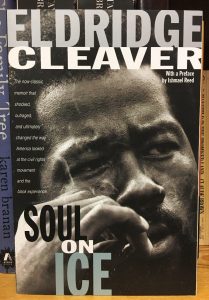
Don’t recognize the name Eldridge Cleaver? He was an early leader of the Black Panther Party, and Prof. McDonald characterizes his memoir Soul On Ice as “a portrait of a Black revolutionary in the making.” The book is “an account of his time in prison, his political views, critical responses to African-American literature and other revolutionary literature he read in prison.” Prof. McDonald sees this work as “one of the many stepping stones in understanding racial currents in America today.”
Meridian (1976) by Alice Walker
Suggested by: Dr. Hersh
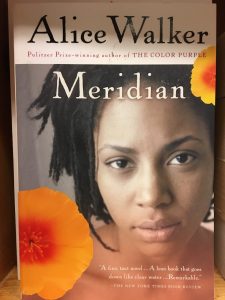
Most people have at least heard of Alice Walker’s famous novel The Color Purple, but Dr. Hersh believes her novel Meridian is also worthy of recognition. She says the novel is “one of the books that converted me to the English major as an undergraduate.” She appreciates that the book “not only is sweeping in its theme—it explores the Civil Rights Movement—but is also intricately put together and so much fun to write about.” For her, reading Meridian was an “eye-opening” experience due to its deep exploration into “the intersection between the Civil Rights Movement and feminism.”
The Intuitionist (1999) or John Henry Days (2001) by Colson Whitehead
Suggested by: Dr. Hiro
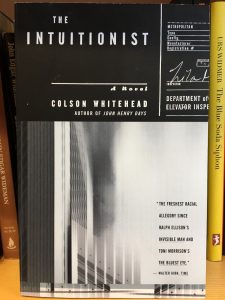
As of late, Colson Whitehead has been lauded for his Pulitzer Prize-winning novel The Underground Railroad. However, Dr. Hiro suggests that you take a look at some of his earlier works as well. The Intuitionist tells the story of two rival factions of elevator inspectors—the Empiricists vs. the Intuitionists. John Henry Days tells the story of—wait for it—John Henry, a Black steel driver who dies trying to beat the very machine that’s set to replace him. Dr. Hiro describes both works as “really quirky, fun, funny novels.” In a world where we tend to “think of African-American literature as [exclusively] serious,” these novels provide a nice contrast.
Citizen: An American Lyric (2014) by Claudia Rankine
Suggested by: Dr. Hiro
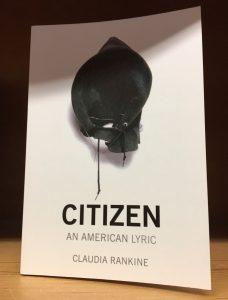
For those who love poetry, Citizen may be the book for you. Dr. Hiro depicts Claudia Rankine’s book as “a hybrid poetry and visual art collection” that “really takes the pulse of race relations right now.” While she knows that it requires patience to sit down and read a book of poetry, Dr. Hiro maintains that Citizen is a real “page-turner” that is worth the effort, as Rankine creates “these incredible impressionistic portrayals of micro-aggressions.”
The March trilogy (completed in 2016) written by John Lewis & Andrew Aydin, illustrated & lettered by Nate Powell
Suggested by: Dr. Larson
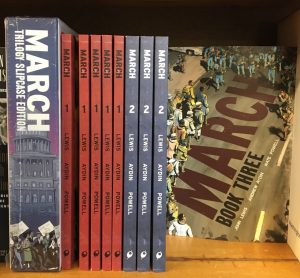
If you want a break from novels and poetry, why not read a graphic novel? Dr. Larson really enjoyed reading the black-and-white comics trilogy March by Georgia Congressman and Civil Rights icon John Lewis. Congressman Lewis found inspiration in the comic Martin Luther King and the Montgomery Story, which was published in 1957 and laid out the principles of nonviolence. The March series is essentially a biography of John Lewis’ life and details his experience of being involved in Civil Rights Movement.
Homegoing (2016) by Yaa Gyasi
Suggested by: Dr. Larson
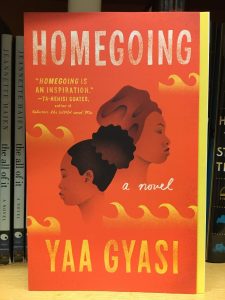
Another recommendation by Dr. Larson is Yaa Gyasi’s debut novel Homegoing. Gyasi is a Ghanaian-American who moved to the U.S. when she was just two years old. Her novel starts with the story of two half-sisters who are born in different villages. One sister marries a British slaver, while the other is sold into slavery and taken to America by way of the Middle Passage. From there, the story recounts their divergent paths.
This list really has something for everyone, so happy reading and Happy Black History Month!
